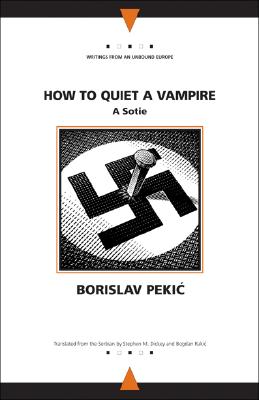How to Quiet a Vampire: A Sotie

How to Quiet a Vampire: A Sotie
The disquieting novel How to Quiet a Vampire is a rumination on terror and intellect in the tradition of Joseph Heller and George Steiner. Published to acclaim in 1977, Pekic's novel of ideas follows Konrad Rutkowski, professor of medieval history and former Gestapo officer, as he returns to the scene of his war crimes determined to renounce, or perhaps justify, his Nazi past. In a series of letters, Rutkowski lays out his ambivalent reactions to war and violence, connecting his own swirling ideas to those of the major figures of European thought: Plato, St. Augustine, Descartes, Nietzsche, Freud, and others. Delving far deeper than mere intellect, however, Borislav Pekic was himself a frequent political agitator and occasional prisoner, and he drew on his first hand knowledge of police methods and life under totalitarianism to paint a chilling portrait of a supposedly free-thinking intellectual acting in the service of repression. At the same time he questions whether Rutkowski's ideology puts him outside the philosophical tradition he so admires--or if the line separating European thought from totalitarianism is not as clear as we like to think.
Descrierea produsului
The disquieting novel How to Quiet a Vampire is a rumination on terror and intellect in the tradition of Joseph Heller and George Steiner. Published to acclaim in 1977, Pekic's novel of ideas follows Konrad Rutkowski, professor of medieval history and former Gestapo officer, as he returns to the scene of his war crimes determined to renounce, or perhaps justify, his Nazi past. In a series of letters, Rutkowski lays out his ambivalent reactions to war and violence, connecting his own swirling ideas to those of the major figures of European thought: Plato, St. Augustine, Descartes, Nietzsche, Freud, and others. Delving far deeper than mere intellect, however, Borislav Pekic was himself a frequent political agitator and occasional prisoner, and he drew on his first hand knowledge of police methods and life under totalitarianism to paint a chilling portrait of a supposedly free-thinking intellectual acting in the service of repression. At the same time he questions whether Rutkowski's ideology puts him outside the philosophical tradition he so admires--or if the line separating European thought from totalitarianism is not as clear as we like to think.
Detaliile produsului












